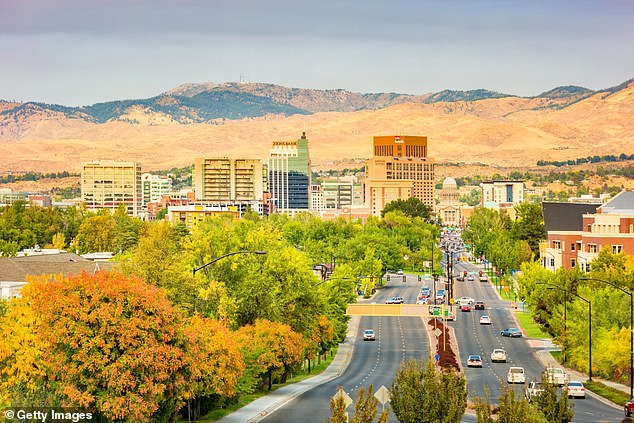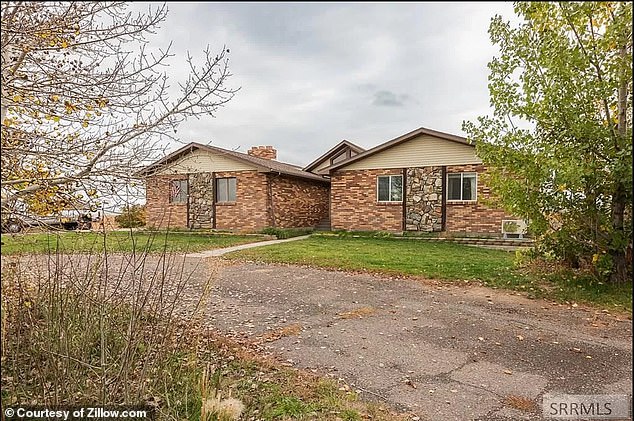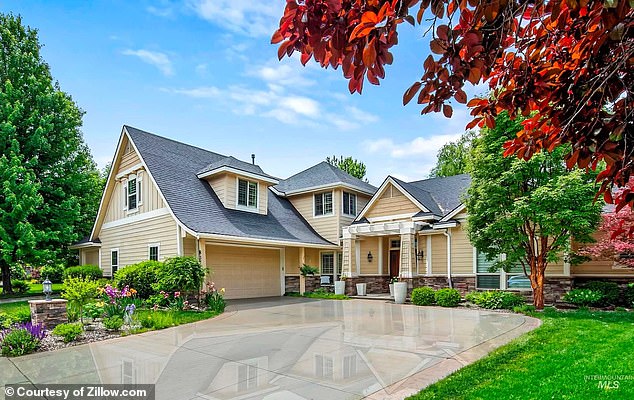Inside America’s Most Overvalued Housing Market: Idaho experienced a real estate boom during the pandemic, but experts say homes are selling for 40% higher than their actual value, putting owners at risk of negative equity
Its vast ski areas, low cost of living and vast hot springs attracted an influx of homebuyers during the pandemic.
But will Idaho’s red-hot housing market suffer a fiery crash? Experts estimate that homes in the Gem State are now more than 40 percent overvalued after rising demand artificially inflated prices.
And because mortgage interest rates are also rising, this means that residents run the risk of ending up in negative equity.
Real estate platform data Redfin shows that the average cost of a home in Idaho’s capital Boise is now $515,000. It marks a decline from their peak of $583,000 in May 2022, but remains well above the $333,029 cost in December 2019.
It’s no wonder experts are concerned.
Data from real estate platform Redfin shows that the average cost of a home in the capital of Boise, Idaho, is now $515,000. It marks a decline from the peak of $583,000 in May 2022, but remains well above the $333,029 cost in December 2019

Americans flocked to rural states like Idaho during the pandemic, as a widespread shift to working from home unleashed workers from big cities like New York and San Francisco
“People who moved there were attracted by its affordability compared to other Western metros, as well as its natural beauty and outdoor lifestyle,” Daryl Fairweather, Redfin’s chief economist, told DailyMail.com.
‘But the housing market has cooled because mortgage rates have risen enormously over the past eighteen months, which has priced out many potential buyers. Most homeowners – especially those who bought before 2022 – have a lot of equity in their homes.”
This week, a report from Moody’s Analytics found that Idaho is home to the most overvalued properties in the US.
Researchers calculated that homes are currently selling for 41.8 percent above their actual value. On average, American homes are overvalued by 15 percent.
When the analysis was conducted, Moody’s used data from August, when the state’s median home price was slightly lower at $476,000. A slight increase in prices this month means homes are becoming even more inflated.
The study looked at the long-term relationship between house prices and the factors driving demand. Demand was calculated based on household incomes in the state, household composition and property construction costs.
Moody’s Analytics economist Matthew Walsh said: ‘If you look at Idaho over the last three years, you’ve seen an extreme increase in home prices since the pandemic began.

Researchers calculated that homes are currently selling for 41.8 percent above their actual value. Pictured: A five-bedroom, four-bathroom home in Sugar City, Idaho, currently on the market for $675,000

A 2022 study by the Idaho Department of Labor found that the average value of a single-family home increased by about 173 percent compared to 2011. Pictured: A 3-bedroom, 4-bathroom home for sale for $624,998 in Sandpoint , Idaho
‘So if you look at that in relation to the demographic factors – family formation and income growth there – that run-up has been so much more extreme and that is why we see the inflated valuation of houses there.’
Americans flocked to rural states like Idaho during the pandemic, as a widespread shift to working from home unleashed workers from big cities like New York and San Francisco.
At the time, properties were priced so high that low-end buyers rushed to purchase them. And Idaho’s picturesque landscapes also gave incarcerated Americans some much-needed respite from their homes.
U.S. Census data shows that Idaho was the second-fastest growing state last year, following a population growth of 1.8 percent.
Rising demand in turn pushed prices up. A 2022 study by the Idaho Department of Labor shows that the average value of a single-family home increased by about 173 percent compared to 2011.
But across the board, fears are growing of a housing price crash in America.
The real estate market has been rocked by the Federal Reserve’s aggressive rate hikes, which in turn have sent mortgage payments soaring.
According to government-backed lender Freddie Mac, the average interest rate on a 30-year home loan is now 7.79 percent. Separate data from Mortgage News Daily suggests interest rates are already at 8 percent for the first time since 2000.
Earlier this month, former analyst Meredith Whitney – once dubbed the “Oracle of Wall Street” – predicted that house prices will fall next year for the first time in a decade.
When mortgage rates rise and home prices plummet, homeowners are at risk of falling into negative equity – meaning the outstanding mortgage balance exceeds the value of their property.
Falling into negative equity can make it difficult to sell or refinance a home, leaving many feeling trapped in their property. The issue turned into a crisis during the 2008 financial crisis, when house prices plummeted overnight.
In July, a report from CoreLogic found that American homeowners had already lost $108.4 billion in home equity this year. Researchers estimate that 200,000 properties are at risk of ‘going under’ if prices fall by another 5 percent.
The data showed that properties in Idaho had already lost $33,000 in equity.
